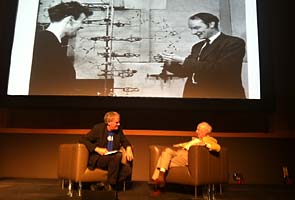Discoverer of DNA says yes to genetically modified food

Dublin, Ireland: Nobel Laureate James D. Watson, credited for the landmark discovery of the structure of the DNA, says “genetically modified foods are good.” 84-year-old Watson says he feels the use of genetically modified foods was a way to save the world from starvation.
 Answering a question asked by NDTV at the ongoing Euro Science Open Forum (ESOF 2012), being held in Dublin where more that 4000 scientists are attending, Watson emphasized that the “use of genetically modified foods is non-brainer. If they are good, use them.”
Answering a question asked by NDTV at the ongoing Euro Science Open Forum (ESOF 2012), being held in Dublin where more that 4000 scientists are attending, Watson emphasized that the “use of genetically modified foods is non-brainer. If they are good, use them.”
Taking an almost diametrically opposite view, India’s Environment Minister Jayanthi Natarajan told NDTV that “genetically modified foods have no place in ensuring India’s food security.” Prime Minister Manmohan Singh in an interview to this correspondent had earlier said, “Biotechnology has enormous potential, and in due course of time we must make use of genetic engineering technologies to increase the productivity of our agriculture. But there are controversies. There are NGOs, often funded from the United States and the Scandinavian countries, which are not fully appreciative of the development challenges that our country faces. But we are a democracy, we are not like China.”
Watson, along with his colleague Francis Crick, almost 60 years ago had deciphered the basic structure of the life giving molecule the Deoxyribose Nucleac Acid (DNA) which passes information on heredity from generation to generation.
Watson said the opposition to genetically modified foods was “irrational” and went on to suggest that some environmentalists “are more whacko than you can think.”
Coming down heavily on the American company that was instrumental in spearheading the early research on genetically modified foods, Monsanto. Watson said “it was a stupid decision by Monsanto to try and control all [research and development] on genetically modified foods.” That was a bad corporate decision, emphasised the man who discovered the double helical nature of the molecule that carries almost all hereditary information. It is this molecule that scientists change artificially in a test tube to engineer genetically modified varieties.
India embraced genetically modified cotton a decade ago and saw acreage under Bt cotton going up by leaps and bounds to a point today when genetically modified cotton varieties are preferred by farmers. But in 2010, the environment ministry put a moratorium on the release of genetically modified brinjal called Bt brinjal developed by the Maharashtra Hybrid Seeds Company Limited (MAHYCO), since then India has not released any other new genetically modified plants that farmers could use.





